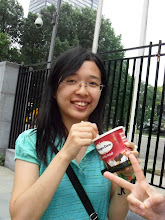Evaluating intercultural behavior
 During the last school vacation, I went on a summer programme to Toronto. It was indeed an eye-opener for me as the culture between Canada and Singapore was really different. I remembered there was one time we visited a fast food restaurant over there and I asked politely for chili sauce after I noticed that chili sauce was not provided as was the norm in Singapore. The lady at the counter looked confused at what I had just said. I thought she might not have heard clearly what I had said, so I repeated my request slightly louder. Again, she can’t seem to understand. So, this time I said I wanted ‘hot sauce’, hopeful that she might understand. But again, to no avail, then I gave up, feeling a little pissed and annoyed that she cannot understand me after many repetitions. The lady looked apologetic. I returned to my seat with the tray of food without my comfort food, chili sauce. I realized ketchup and mustard seemed to be the only sauce that they ate.
During the last school vacation, I went on a summer programme to Toronto. It was indeed an eye-opener for me as the culture between Canada and Singapore was really different. I remembered there was one time we visited a fast food restaurant over there and I asked politely for chili sauce after I noticed that chili sauce was not provided as was the norm in Singapore. The lady at the counter looked confused at what I had just said. I thought she might not have heard clearly what I had said, so I repeated my request slightly louder. Again, she can’t seem to understand. So, this time I said I wanted ‘hot sauce’, hopeful that she might understand. But again, to no avail, then I gave up, feeling a little pissed and annoyed that she cannot understand me after many repetitions. The lady looked apologetic. I returned to my seat with the tray of food without my comfort food, chili sauce. I realized ketchup and mustard seemed to be the only sauce that they ate.With regard to this incident, I would think it could be a problem of difference in accent or the food culture. Westerners are generally not known to be fans of spicy food. Even the red chili there costs more. They might have been confused over why would anyone asked for chili sauce while I was confused over why would a fast food restaurant not provide any chili sauce. On the other hand, it could also be a problem of accent. I remembered I had to repeat my sentences on various occasions.
This incident showed that when communicating with people of different country and culture, we have to be patient and empathetic. Accents and pronunciation can indeed confuse listeners across culture despite a common language, moreover the difference in our food culture just adds on to the confusion in this situation.


